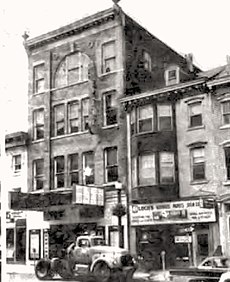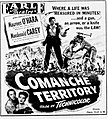Category:Earle Theater, Allentown, Pennsylvania
| Object location | | View all coordinates using: OpenStreetMap |
|---|
former movie theater in Allentown, Pennsylvania, United States | |||||
| Upload media | |||||
| Instance of | |||||
|---|---|---|---|---|---|
| Location | Allentown, Lehigh County, Pennsylvania | ||||
| Street address |
| ||||
 | |||||
| |||||
The Earle Theater was built in Allentown in 1927 at 20 North Eighth Street. Originally owned by William E Steitz, the theater was leased to the Earle Amusement Company of Atlantic City, NJ. It was managed locally by Frank S. Mickley. The theater was originally planned as a silent theater with a large Mueller organ and a 50 seat orchestra pit. The four-story cinema (its upper floors were professional offices, the 3d and 4th floor having a two-story windowed atrium in the front)
A November opening was planned, however at the last minute, the theater was purchaced by the Warner-Equity company who was decided to equip the theater with the Warner Vitaphone-Movietone sound system, which would allow the theater to show the new sound films. However the Vitaphone system in 1927 was a coordinated record and film system, which synchronized a separate record to the film being projected. It was, however, the first theater in Allentown to be equipped with it and its first public showing was on December 14th 1927, showing "The Prince of Headwaiters", starring Lewis Stone, a mostly silent film which had scenes in sound. The theater continued to offer Vitaphone films, one of them being "The Jazz Singer", with Al Jolson. Although still primarily a silent feature, the Jazz Singer was the major Hollywood film that ushered in the age of sound pictures. In 1930, the newer and more modern Photophone sound-on-film system was installed, which was much less cumbersome to operate and provided superior sound quality. Frank Milkley left the Earle in 1929 however to run the new Cameo Theater on Hamilton Street, next to the Americus Hotel. He was replaced by William Keegan, and later by Harry Bernstein. The theater was closed at the end of May 1933 when Warner could not operate the theater profitably due to the Great Depression.
After the closure, Warner leased the theater to the Wilmer and Vincent chain, who owned the Colonial, State and Rialto theaters, but the theater remained closed and was eventually put up for sale by Warner. The theater was purchased in April 1935 by Max and Leon Kerr, who after clearing some legal entanglements, reopened it in April 22nd 1935 with a Universal double-bill "Green Eyes" and "Gift of Gab". The Kerr brothers ran the theater for many years after that, operating it successfully for many years. The Earle generally showed films from the smaller Hollywood Studios, such as RKO and Republic and Universal, however it did get the occasional film from major studios such as Paramount, MGM, Warner Brothers and Fox. Leon passed in 1952 and Max continued to operate it afterwards. During the 1950s, the Earle was upgraded to show Cinemascope pictures, along with 3-D films, and films with stereo sound.
In the summer of 1960, legal disputes began over the theater between Kerr and his stockholders, which led to its eventual closure in April 1961. Max Kerr subsequently gave up his ownership and then took over management of the Rialto Theater on Hamilton Street. A court hearing forced the sale of the Earle Theater in order to satisfy the demands of the stockholders who had invested in it over the years it was owned by Kerr. It was subsequently purchased by the Park & Shop cooperative in September 1961, which tore it down and it became an asphalt parking lot. In July 2021, it was announced that the land would be sold and redeveloped for the new Da Vinci Center.
Max Kerr retired in 1969 when the Fabian Chain terminated its lease of the Rialto theater. He passed in 1971.
Subcategories
This category has only the following subcategory.
Media in category "Earle Theater, Allentown, Pennsylvania"
The following 15 files are in this category, out of 15 total.
-
1927 - Earle Theater - 24 Dec MC - Allentown PA.jpg 2,009 × 1,689; 537 KB
-
1927 - Earle Theater - Allentown PA.jpg 1,600 × 1,090; 276 KB
-
1929 - Earle Theater - 8 Dec MC - Allentown PA.gif 1,567 × 1,507; 1.01 MB
-
1935 - Earle Theater Matchbook - Allentown PA.jpg 1,024 × 440; 119 KB
-
1940 - Earle Theater - 19 Sep MC - Allentown PA.jpg 981 × 995; 186 KB
-
1949 - Earle Theater - 21 Nov MC - Allentown PA.jpg 936 × 1,786; 340 KB
-
1950 - Earl Theater Ticket Stub.jpg 600 × 322; 68 KB
-
1950 - Earle Theater - 10 Jan MC - Allentown PA.jpg 949 × 2,113; 345 KB
-
1950 - Earle Theater - 12 Sep MC - Allentown PA.jpg 1,414 × 1,848; 378 KB
-
1950 - Earle Theater - 2 Jun MC - Allentown PA.jpg 1,401 × 1,549; 363 KB
-
1950 - Earle Theater - 30 Dec MC - Allentown PA.jpg 881 × 637; 125 KB
-
1961 - Earle Theater Closed - 7 Sep MC - Allentown PA.jpg 761 × 933; 124 KB
-
1961 - Earle Theater Closing - 19 Mar MC - Allentown PA.jpg 426 × 768; 78 KB
-
Earle theater Philadelphia main lobby 1928.jpg 2,048 × 2,022; 1.75 MB
-
Proscenium side arches Earle theater 1928.jpg 1,682 × 2,048; 1.37 MB















